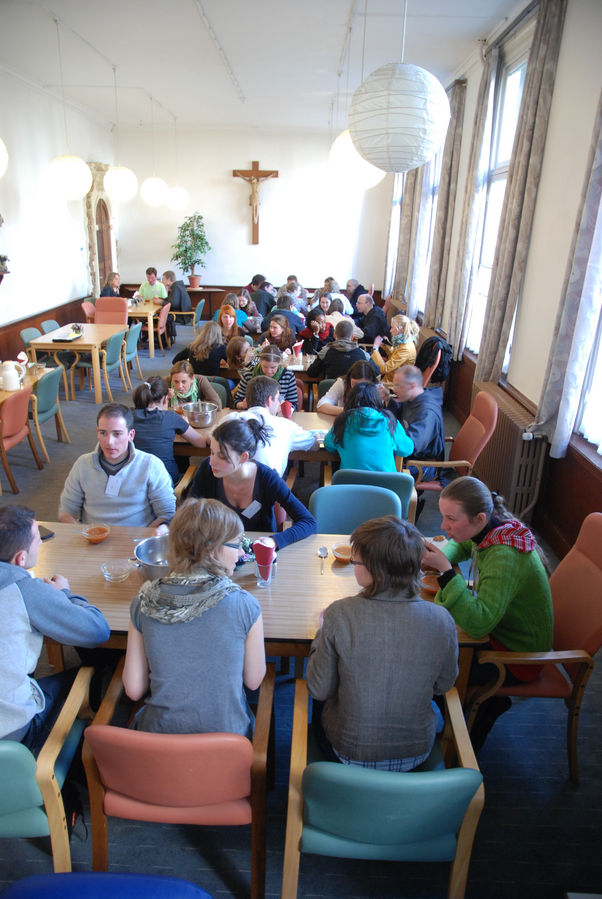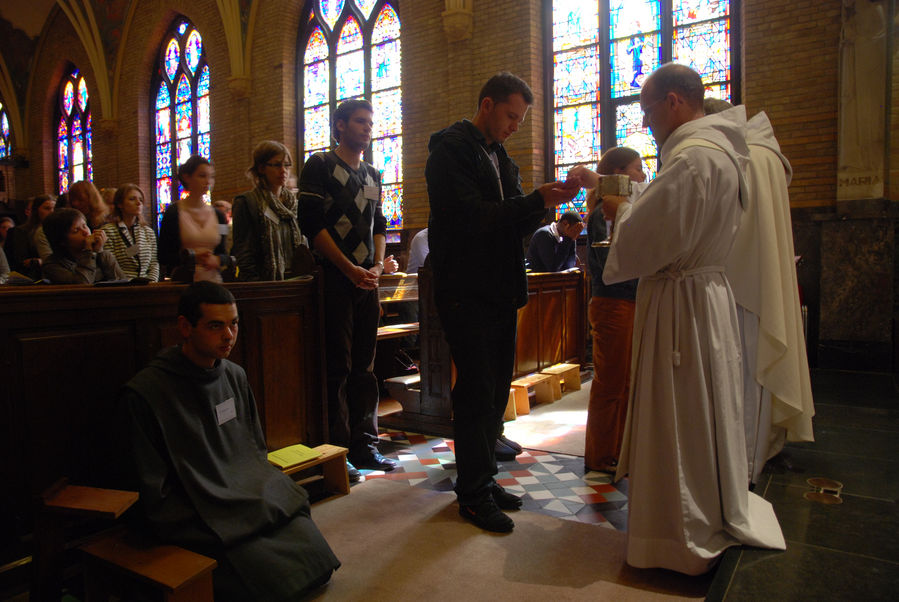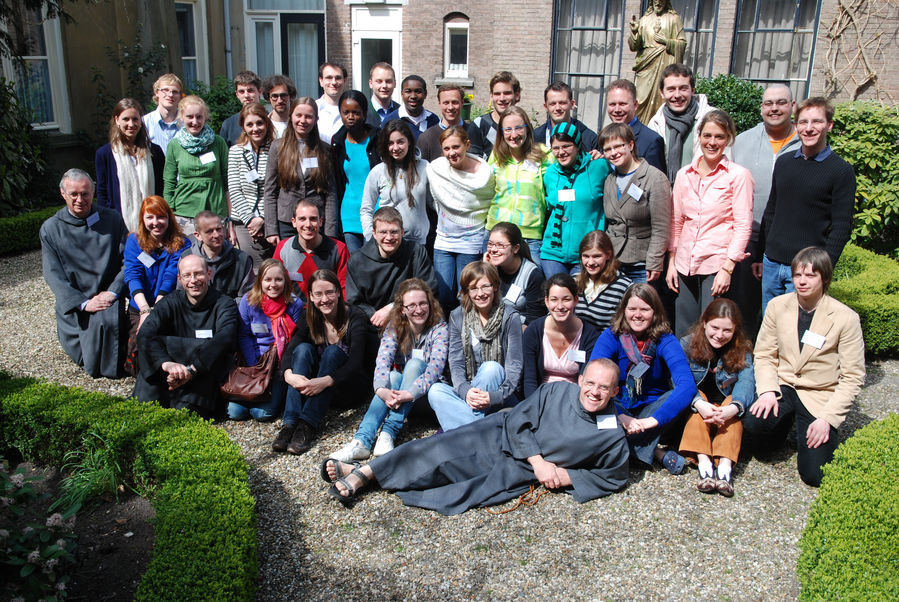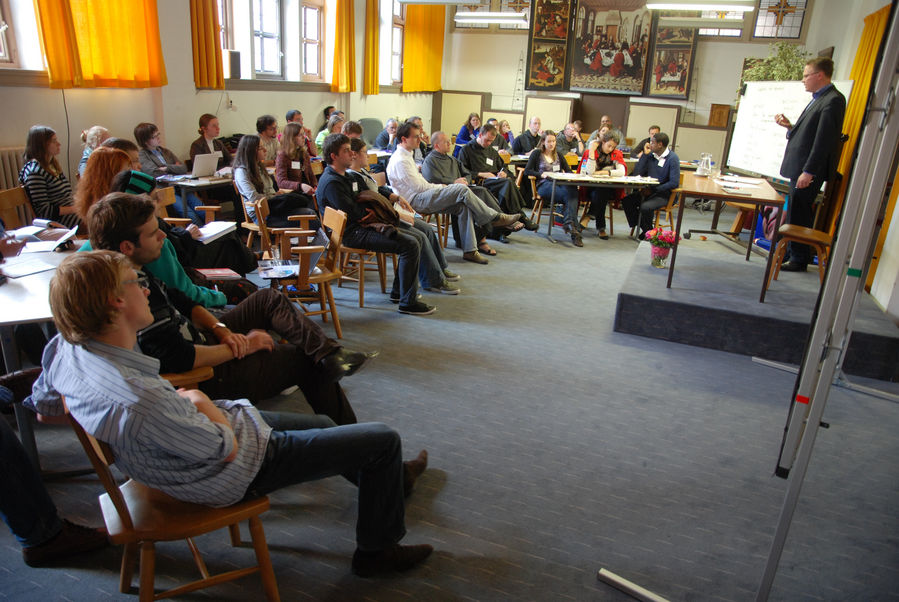Friday: Peace is not that evident…
Groups are slowly starting to gather together. Wherever you go in the house you find new (lost) people to meet and to shake hands with. Some are just getting used to speaking English, but the first contacts are made anyhow. Equipped with a richly filled program booklet everyone gets ready to take place as the tables are set to share the first meal together. No groups per country, but mixed, everyone enthusiastic to get to know one another. The weekend starts officially with a film and the instruction to be attentive to whom contributes to peace and who is resisting peace and why.
 Saturday: Peace and development, at the service of the human person
Saturday: Peace and development, at the service of the human personAfter morning prayer and breakfast, the day is started by a framing lecture introducing the theme of the day. Father Thomas: ‘What is peace?!’ Peace is tranquility brought forth by order. Not just any order, but the right order! This right order is the consequence of a goal, a finality. This finality is found in the other, in loving another person. Is it possible to find true peace without loving, without friendship? After this challenging lecture it is time for two reflective lectures by Dr. Richard Steenvoorde. First about the development of international law: the discovery of human dignity. The second about Catholic social teaching and the encyclical Deus caritas est. In the afternoon workshops like ‘Searching for truth: a service to humanity’ and ‘Serving the fragile person: medical and personal care’, are given. The day is closed by presentations of the different countries, local snacks and dances included.
Sunday: Peace and religions, openness to the transcendent as a way for peace
‘Where are we going?’, one of the questions asked at the beginning of this new day in our quest for peace. Since we cannot find the answer to this question without God, we get together for the celebration of the Eucharist. It is going to be a long day so we prepare our lunches too. We’re going for an adventure. Before leaving we receive an input about the religious dimension of the human person: how important it is to open up to the other, no matter how different he or she is, since we are all children of the same Father. ‘Each person has the possibility to discover God by means of his own intelligence’, so says Father Thomas. ‘Through our surrounding we can discover the existence of the Creator’. Later on we have a lecture by Father Christophe Marie about the tensions in Rumania between orthodox’s, Greek orthodox’s and the Roman Catholics. The history of separation, the conflicts that have taken place after the fall of communism, as well as the undertaken actions in recent history in order to come to reconciliation. Then it’s time to leave together by bus to the Mevlana Mosque in Rotterdam. A warm welcome was awaiting us and no corner remained hidden to our cameras. Already struck by the beauty of the building, we were even more surprised by the words of a young Muslim, Birol Ona, who gave us a talk in the Center for Islam and Dialogue. He spoke about the influence of faith in his life, how he feels it makes him richer. We felt him very close to us. Afterwards we were able to join a few young Muslims for their meal. Questions were going back and forth while we were enjoying the delicious food. Adoration and confession was a good way to close the day: no doubt, enough to over think.
 Monday: Peace and justice, pursuing justice for the good of peace
Monday: Peace and justice, pursuing justice for the good of peaceToday again a very full program! As usual the day is started by a framing lecture. Today it is called: obstacle for peace: the brokenness of humanity. After this we are having a wonderful walk to the Tribunal for the former Yugoslavia. Despite a thorough security check we are all admitted and searching our way to the tribune over viewing the room in which the trial of Karadzic is taking place. It’s weird to be able to follow a part of this hearing. After a meeting with a staff member of the tribunal we are heading to the representative of the European Communion. Here we attend an introduction about the peace project ‘Europe’. Once home again, Frederic Ossogo, trial attorney of the tribunal, gives us his personal testimony. As a christian he is called to travel around the world with his family at the service of this work. A day full of encounters which we end by celebrating Mass with the intention ‘peace for the World’.
 Tuesday: Commitments for peace, how can I commit to peace?
Tuesday: Commitments for peace, how can I commit to peace?It went so fast and it’s already the last day. Edwin Ruygrock of Pax Christi tells us how we can put our lives as Christians at the service of peace. Professor Alting von Geusau inspires us with his lecture about the challenges for Europe today. A representative of the ministry of defense gives us an introduction about the work they do for peace. A lot of input followed by the last gathering in common with evaluation and ‘what next’. In a moment of worship with guitar at the beach we thank God for these intense and intimate days we were able to experience with Him and with one another… Something which remains is the ease with which people with such different backgrounds were able to get in contact with each other, could discuss on a complete different level than at home, where friendships could flourish, unity and peace maybe in the common research of these days. That this is the end is for now still hard to believe, as one of the participants wrote the next day on the internet forum: ‘I am at the university now, but I feel that I haven’t returned yet! J somehow I still hear your voices, remember those so unnatural ;) but beloved streets, time and again remember this or that thought from lectures, and how we sang that Lithuanian glee and… Now I have to concentrate on lecture about thinking and language but I can’t get up from that really good dream!!’
 ‘Sweet, sweet peace’, ‘an indefinable term’, ‘an utopia’, ‘hippies with a joint’, ‘what to do with it?!’ These were the different associations to peace the Dutch participants of the conference Commitments for Peace had beforehand. Despite the ashes (from the Icelandic vulcano), almost fifty participants from Lithuania, Rumania, Austria, the United Kingdom, and some from Albania, Croatia, Nigeria and France, gathered together in the royal residence of The Hague, for a meeting that would last over four days.
‘Sweet, sweet peace’, ‘an indefinable term’, ‘an utopia’, ‘hippies with a joint’, ‘what to do with it?!’ These were the different associations to peace the Dutch participants of the conference Commitments for Peace had beforehand. Despite the ashes (from the Icelandic vulcano), almost fifty participants from Lithuania, Rumania, Austria, the United Kingdom, and some from Albania, Croatia, Nigeria and France, gathered together in the royal residence of The Hague, for a meeting that would last over four days.